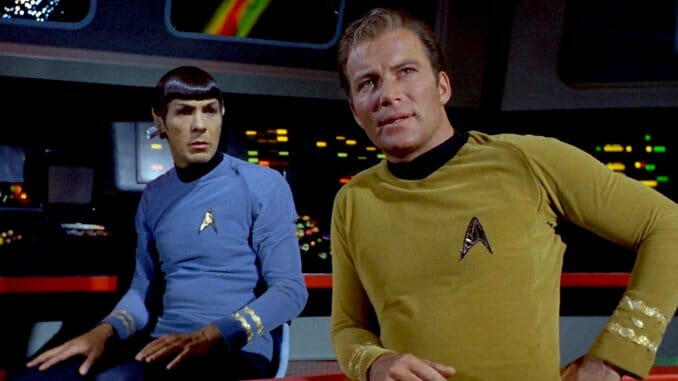Star Trek: The Original Series Still Provides Real, Revolutionary Hope for Our Future
Photo Courtesy of CBS
Life around the world, and especially in the USA, is becoming so bleak and hopeless that we’re running out of apt metaphors to visualize the size of the dumpster fire our daily sociopolitical existence has become. A deadly pandemic has brought us to our knees, made extensively worse by the politicization and belittlement of science and common courtesy in relation to our communion as human beings. Millions are marching on the streets not only for racial equality, but for the audacity to demand that authorities don’t lynch them in plain view and get away with it. Blindly destructive and giddily cruel authoritarianism is on the rise as true democracy is on life support. On top of all this, climate change is just around the corner, threatening our very existence.
Art and entertainment can provide a mirror to our common psyche, and give us hope or despair depending on what we need to get out of it. These days, we can certainly find some nihilistic comfort in George Carlin’s assertion that the planet will be fine after it shakes us humans—we pests that are useless to it other than to maybe provide it with plastic—off of itself for good. But what about a hopeful message that can lift us to fight, and give us the spiritual ammunition to look forward with optimism?
For that, I don’t think there’s a more inspirational and calming source than Gene Roddenberry’s initial vision for Star Trek, also known as The Original Series. Sure, the Trek properties that followed TOS, the movies, The Next Generation, Deep Space Nine and so on, kept promoting the show’s vision of a United Federation of Planets that worked towards a common cause for peace and equality—while further amplifying larger scale action set-pieces as production budgets increased and special effects technology evolved.
But re-watching TOS these days provides us with a unique and direct link to another time when humanity, or at least the optimism for its purity, appeared to be doomed. Thus, Roddenberry’s downright aggressive calls for appealing to the best of our natures, while our worst was in the captain’s seat, feels especially relevant today. It’s like a message from the past, one that assures us that we’ve been through this pain before, and more than likely will again. However, that’s what makes dedicated and patient work for a better, more understanding, more inclusive future that much more vital; Star Trek: The Original Series is always there to remind us of this simple fact.
During the latter half of the 1960s, when Roddenberry showed the United States that he indeed had giant Roddenberries for creating a show about a future socialist utopia during the height of the country’s Red Scare, our world was in a similar state of turmoil: The righteous fight for civil rights led to much bloodshed and division. The Vietnam War pulled the curtain off America’s façade as the protectors of Earth and revealed it as a potential evil empire it was chomping at the bits to become, about to be led by an administration that showcased similar authoritarian grabs for ultimate power at the expense of crushing the weak and the powerless.
At this time came Roddenberry’s Trek, which posited a 23rd Century where humankind eventually left behind their differences to work together towards the common goal of reaching beyond the stars. The show came at a time when minorities were depicted almost solely as servants or intellectual inferiors to white characters on TV, and women could only be portrayed as docile housewives. Yet here was the USS Enterprise spacecraft populated by people of color and women—with Chief Communications Officer Nyota Upenda Uhura (Nichelle Nichols) as both—in various positions of influence and power, their accomplishments based solely on merit and not on being white men. Prejudice and superiority based on race and gender is such a thing of the past that equality in the Federation transcends species and treats other alien races with the same dignity and respect.
The clearest manifesto of Roddenberry’s future is showcased in the episode Plato’s Stepchildren (S03E10), where the core Enterprise crew is stuck on a planet full of humanoid aliens who fashioned themselves after ancient Greek gods, and use their telepathic powers to make the crew debase themselves for their amusement. Before the crew beamed down on their planet, the gods used a powerless little person named Alexander (Michael Dunn) for entertainment.
After great leader and insatiable horndog Captain James Tiberius Kirk (William Shatner) oversees a possible escape from the predicament, he offers Alexander a place in The Federation so his life of humiliation can end. Alexander asks Kirk; “Where you come from, are there a lot of people without the power and my size?” Kirk kneels down and looks him straight in the eyes to reply; “Where I come from, size, shape, or color makes no difference, and nobody has the power.” Roddenberry not only talks the talk of equality and opportunity, but he also walks it by giving a little person actor a dignified dramatic role with depth, at a time when roles for little people on TV and film was relegated to glorified circus acts.
-

-

-

-

- Curated Home Page Articles By Test Admin October 21, 2025 | 3:10pm
-

- Curated Home Page Articles By Test Admin October 21, 2025 | 2:57pm
- Urls By Test Admin October 21, 2025 | 2:57pm
- Curated Home Page Articles By Test Admin October 21, 2025 | 2:55pm
-

-

-

-

-

-

-

-

-

-

-

-

-

-

-

-

-

-

-

-

-

-

-

-

-

-

-

-

-

-

-




































